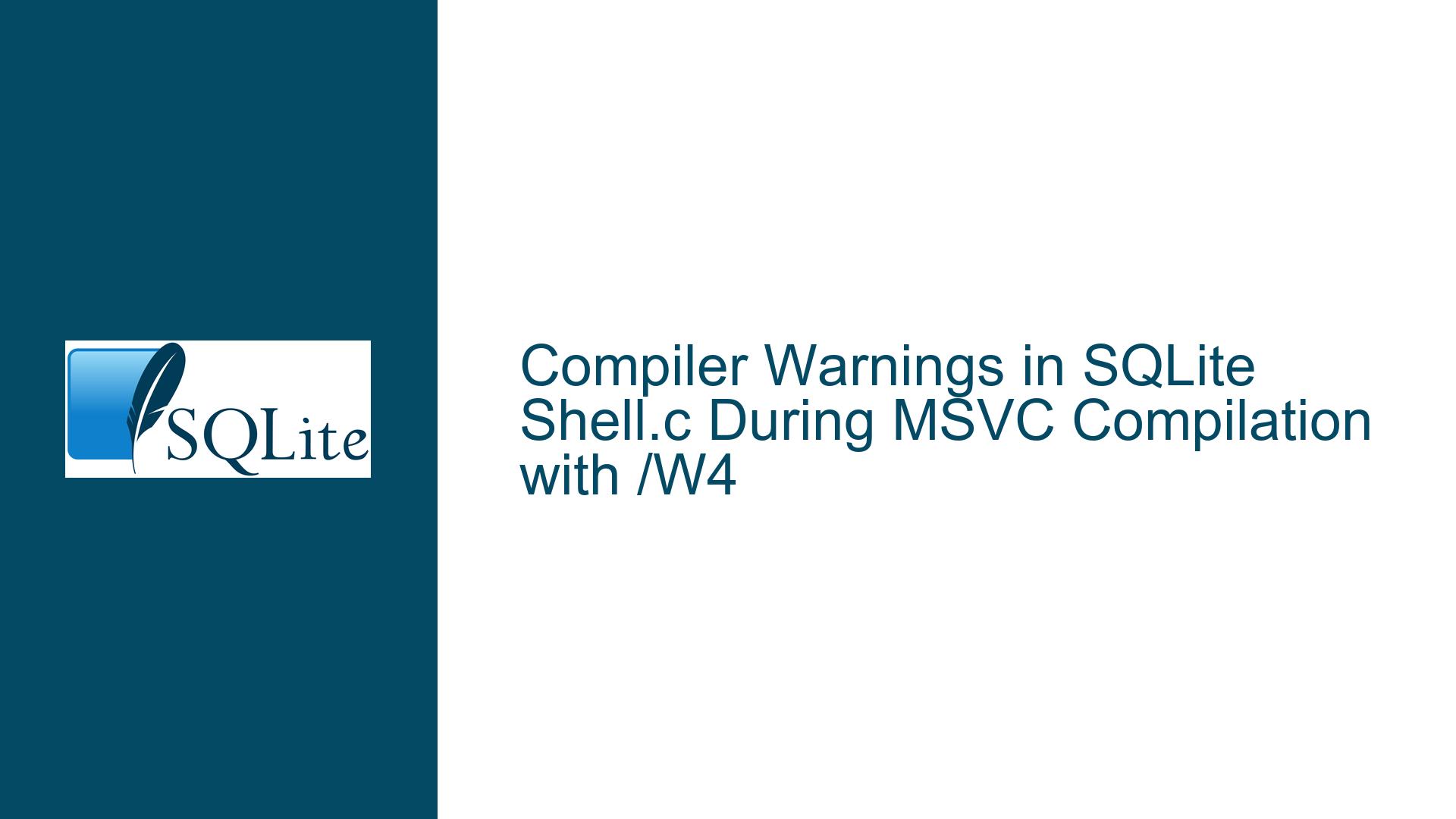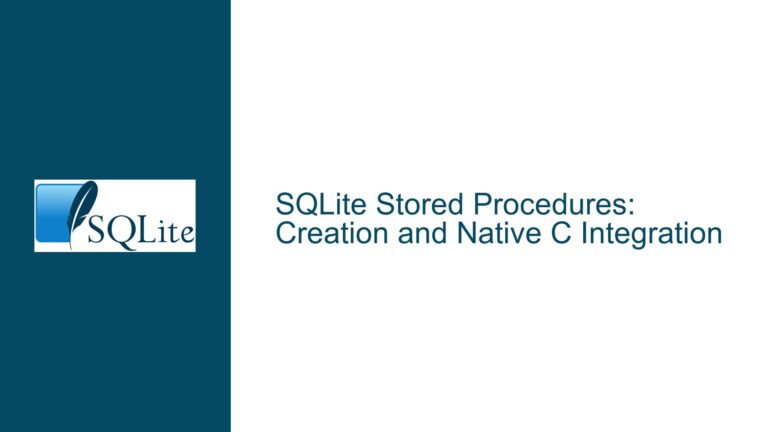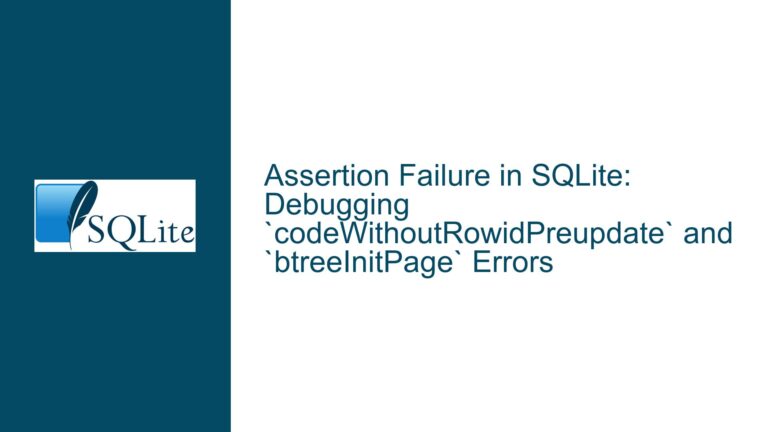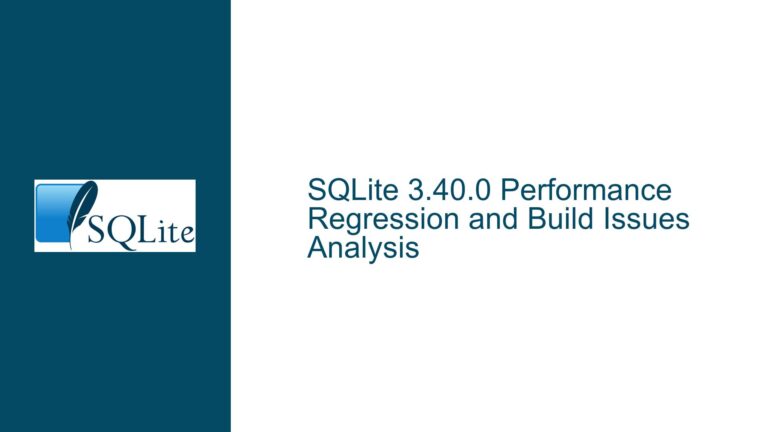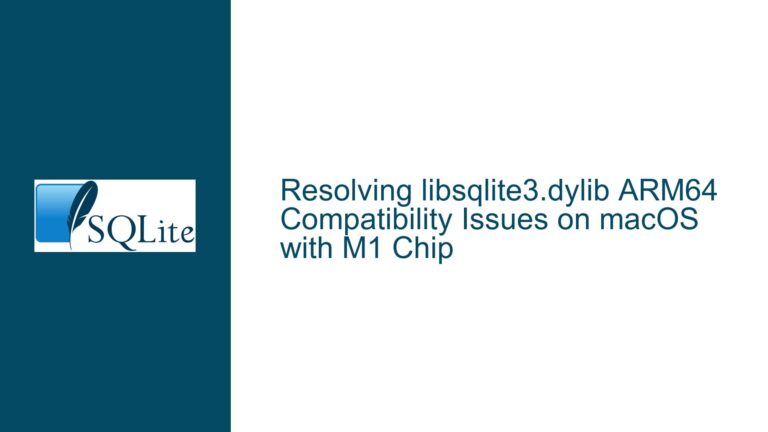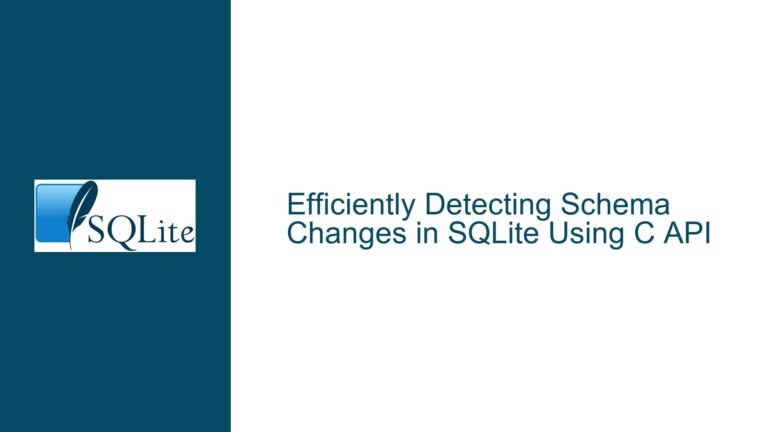Compiler Warnings in SQLite Shell.c During MSVC Compilation with /W4
Compiler Warnings Due to Type Conversion in SQLite Shell.c
The core issue revolves around compiler warnings generated during the compilation of the SQLite shell.c file using Microsoft Visual C++ (MSVC) with the /W4 warning level. These warnings are primarily related to type conversions, specifically from int to char and from sqlite3_int64 to int. While these warnings are generally harmless and do not affect the functionality of the compiled code, they become problematic when the /WX flag is used, which treats all warnings as errors. This forces the compilation process to halt, preventing the successful build of the SQLite shell.
The warnings are triggered by assignments and function calls where data types of different sizes are involved. For instance, assigning an int to a char or passing a sqlite3_int64 to a function that expects an int can lead to potential data loss, which the compiler flags as a warning. These warnings are particularly prevalent in the shell.c file, which is part of the SQLite amalgamation.
The specific lines in shell.c where these warnings occur are:
- Line 4776: Conversion from
inttochar. - Line 4797: Conversion from
inttochar. - Line 13100: Conversion from
sqlite3_int64tointin a function call. - Line 13110: Conversion from
sqlite3_int64tointin a function call. - Line 13127: Conversion from
sqlite3_int64toint. - Line 18155: Conversion from
sqlite3_int64toint. - Line 18247: Conversion from
inttochar. - Line 18251: Conversion from
inttochar.
These warnings are indicative of potential issues that could arise if the data being converted exceeds the range of the target type. For example, if a large int value is assigned to a char, the value may be truncated, leading to unexpected behavior. Similarly, converting a sqlite3_int64 to an int could result in data loss if the sqlite3_int64 value is outside the range of a standard int.
MSVC Compiler Strictness and Type Safety Enforcement
The root cause of these warnings lies in the strict type-checking and safety enforcement mechanisms of the MSVC compiler, especially when the /W4 warning level is enabled. The /W4 flag enables a high level of warning messages, including those related to type conversions that could potentially lead to data loss. This is a feature of the MSVC compiler designed to help developers catch potential issues early in the development process.
The warnings are not necessarily indicative of a bug in the SQLite code but rather a reflection of the compiler’s strict adherence to type safety. The SQLite codebase is designed to be highly portable and is typically compiled with a wide range of compilers and settings. However, the MSVC compiler, particularly with the /W4 flag, is more stringent in its type-checking than other compilers, leading to these warnings.
The specific compiler version used in this case is Microsoft (R) C/C++ Optimizing Compiler Version 19.28.29395.4 for x64. This version of the compiler includes several optimizations and strict type-checking features that contribute to the generation of these warnings. Additionally, the use of the /WX flag, which treats all warnings as errors, exacerbates the issue by preventing the compilation from completing successfully.
The compiler settings used in this case include a variety of flags and options that further contribute to the strictness of the type-checking. For example, the /Zc:wchar_t- flag disables the native wchar_t type, which can affect type conversions involving wide characters. The /Zp8 flag sets the structure packing alignment to 8 bytes, which can also influence how data types are handled during compilation.
Resolving Type Conversion Warnings in SQLite Shell.c
To address these warnings, several approaches can be taken, depending on the specific requirements and constraints of the development environment. The most straightforward solution is to modify the compiler settings to reduce the strictness of the type-checking. This can be achieved by lowering the warning level from /W4 to /W2, which disables some of the more stringent warnings related to type conversions. This approach was successfully used in this case to bypass the warnings and allow the compilation to proceed.
However, this is not always a viable solution, especially in environments where strict type-checking is required. In such cases, the code itself can be modified to explicitly handle the type conversions in a way that satisfies the compiler’s type-checking requirements. This can involve casting the values to the appropriate type before assignment or function calls, or modifying the function signatures to accept the correct types.
For example, in the case of the conversion from int to char, the code can be modified to explicitly cast the int value to a char before assignment:
char c = (char)some_int_value;
Similarly, for conversions from sqlite3_int64 to int, the code can be modified to ensure that the value being passed is within the range of an int, or to use a different function that accepts a sqlite3_int64 parameter:
int i = (int)some_sqlite3_int64_value;
In cases where the function signature cannot be modified, it may be necessary to add additional checks to ensure that the value being passed is within the acceptable range for the target type. This can involve adding assertions or conditional statements to validate the data before it is used.
Another approach is to use compiler-specific pragmas to suppress specific warnings. For example, the #pragma warning directive can be used to disable specific warnings for a section of code:
#pragma warning(push)
#pragma warning(disable: 4242)
// Code that generates the warning
#pragma warning(pop)
This approach allows the rest of the code to be compiled with the strict type-checking enabled, while selectively disabling the warnings for specific sections of code where the conversions are known to be safe.
In addition to these code-level changes, it is also important to consider the broader implications of these warnings. While they may be harmless in the context of the SQLite codebase, they can indicate potential issues in other codebases where similar type conversions are used. As such, it is important to carefully review and address these warnings to ensure the robustness and reliability of the code.
Finally, it is worth noting that the SQLite development team may choose to address these warnings in future releases of the codebase. This could involve modifying the code to explicitly handle the type conversions, or adding compiler-specific pragmas to suppress the warnings. In the meantime, the approaches outlined above provide a practical way to address these warnings and allow the compilation to proceed successfully.
In conclusion, the compiler warnings generated during the compilation of the SQLite shell.c file with the MSVC compiler and the /W4 flag are primarily related to type conversions that could potentially lead to data loss. While these warnings are generally harmless, they can prevent the compilation from completing successfully when the /WX flag is used. By modifying the compiler settings, explicitly handling the type conversions in the code, or using compiler-specific pragmas to suppress the warnings, these issues can be resolved, allowing the compilation to proceed without errors.
